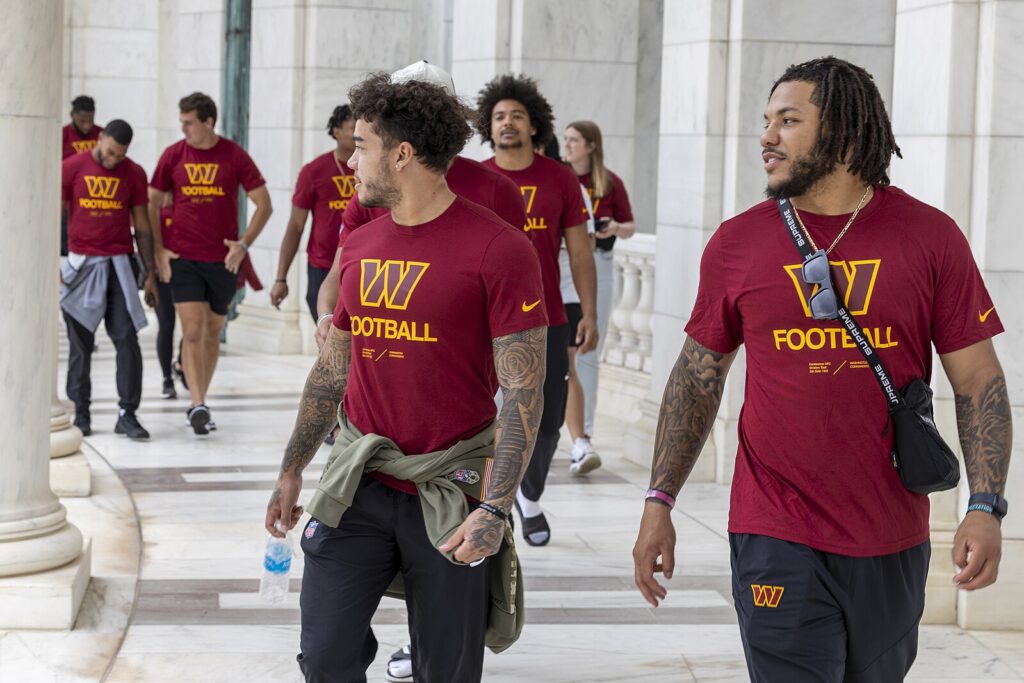President Donald Trump has threatened to block the Washington Commanders’ new stadium plans unless they revert to their former name. Trump wrote on Truth Social, “The Washington ‘Whatever’s’ should IMMEDIATELY change their name back to the Washington Redskins Football Team. There is a big clamoring for this.” He then added, “I may put a restriction on them that if they don’t change the name back to the original ‘Washington Redskins,’ and get rid of the ridiculous moniker, ‘Washington Commanders,’ I won’t make a deal for them to build a Stadium in Washington.”
Federal Authority Could Complicate Stadium Plans
The threat matters for the franchise’s relocation plans according to media coverage. The Commanders want to build at the former RFK Stadium site, which would mark the end of their 30-year absence from Washington and revitalize a historic area of the capital. Congress transferred control of the site to D.C. for 99 years in legislation signed by former President Joe Biden in January. Trump’s exact options for intervention remain unclear. But federal involvement in infrastructure projects often gives presidents ways to exert influence when public funding is involved.
From Oval Office Partnership to Public Ultimatum

The president’s current stance represents a huge shift from his position just two months earlier. Back then, In May 2025, Trump hosted NFL Commissioner Roger Goodell, Commanders owner Josh Harris, and D.C. Mayor Muriel Bowser in the Oval Office to announce that Washington would host the 2027 NFL Draft on the National Mall. The cooperative announcement, where Harris presented Trump with a Commanders jersey and football while calling him the “ultimate commander,” suggested a collaborative relationship between all parties involved in the stadium project.
Trump Extends Campaign to Other Professional Teams
Trump’s campaign extends beyond football to baseball. He called for the Cleveland Guardians to revert to their previous name, the Cleveland Indians. His post included the phrase “MAKE INDIANS GREAT AGAIN,” echoing his political slogan while advocating for the name change that occurred in 2021. “Our great Indian people, in massive numbers, want this to happen,” Trump claimed without providing supporting evidence. “Their heritage and prestige is systematically being taken away from them.” The Cleveland Guardians organization declined to comment.
Corporate Pressure Forced Original Name Change
The NFL team’s name change in 2020 followed years of mounting pressure from multiple directions. Native American advocacy groups, major sponsors including FedEx and Nike, and members of Congress all pushed for the organization to abandon what many considered a racial slur. The criticism reached a tipping point when major sponsors threatened to withdraw financial support. This forced then-owner Dan Snyder to reverse his long-standing refusal to consider alternatives.
Two-Year Transition Led to Current Identity

The transition was rocky for the Washington franchise. After dropping “Redskins,” the team spent two seasons as the “Washington Football Team” while conducting market research and soliciting fan input for a permanent replacement. The “Commanders” name resulted from this process in early 2022, though fan reception remained mixed. Current ownership under Josh Harris. The person who purchased the team from Snyder has not publicly indicated any reconsideration of the name choice despite Trump’s pressure. Team sources suggest no internal discussions about reverting to the former identity are taking place.
Former Players Rally Behind Trump’s Position
The president’s position finds support among some former players, particularly Jason Buck. A NFL defensive lineman who helped the team win Super Bowl XXVI. Buck, who identifies as Native American, has joined the Native American Guardians Association to advocate for the restoration of the former name. “It’s like your grandma passed away, and your grandpa marries a new woman and she comes in and takes all the pictures out of the house and puts hers up,” Buck said during a recent interview. “It’s like, you just lost your family. It was devastating to everybody.” Buck expressed eagerness to meet with Trump, saying he would “give anything” for such an opportunity. His message would be straightforward. “Stand with us and stand for common sense.”
Cultural Debate Reveals Deep Divisions
The debate reflects deeper tensions about how NFL franchises honor or appropriate cultural symbols. Advocates for the name change, including Suzan Harjo of the Cheyenne and Arapaho tribes, have argued that the “R-word” connects to racist attitudes that perpetuated violence against Native Americans. Harjo, who fought for decades to change the team’s name, described how the term was weaponized against Indigenous people throughout her childhood. However, other Native American voices have supported keeping traditional names, arguing they honor rather than demean Indigenous heritage. This division within Native communities has made the broader conversation about sports mascots and team identities more difficult.
Stadium Project Faces Multiple Political Hurdles

Trump’s intervention comes as the stadium project faces major political challenges beyond the name dispute. D.C. Council members must balance competing interests while evaluating a proposal that could reshape a prominent section of the city. The Council now weighs a multibillion-dollar redevelopment plan that would transform the federal property into a modern sports and entertainment district. The president’s ultimatum adds another variable to an already detailed negotiation involving multiple levels of government, private developers, and public stakeholders.
Teams and Officials Remain Silent on Demands
The franchise has not publicly responded to Trump’s demands. Representatives from the NFL and D.C. Mayor Muriel Bowser’s office have also not issued statements addressing the president’s ultimatum. Whether Trump’s threats materialize into concrete action remains to be seen. The intersection of federal authority, local governance, and private enterprise in major development projects creates multiple pressure points where presidential influence might emerge. In the meantime, the Commanders face a choice between their carefully selected new identity and their ambitious plans for a return home.
Read More: Trump’s Latest Approval Ratings Reveal Surprising State-by-State Shift
